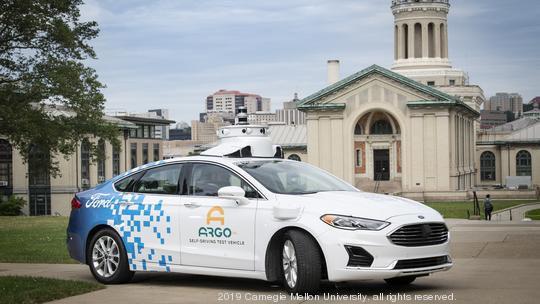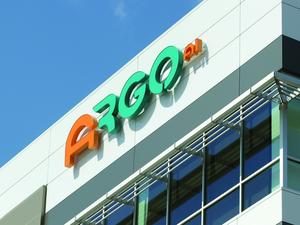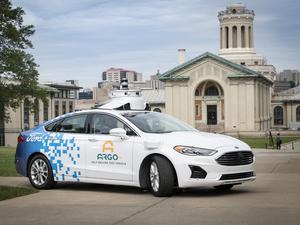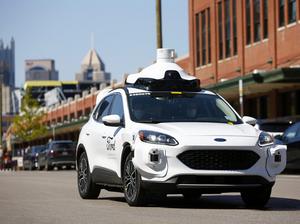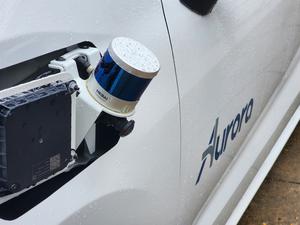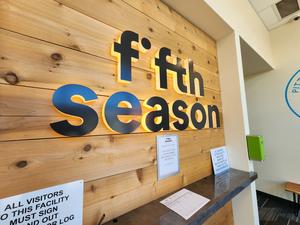Argo AI LLC’s shuttering last month brought Pittsburgh’s innovation scene to a yet-to-be-seen reality amid the backdrop of a national tech downturn.
The autonomous vehicle startup’s closure led to the termination of nearly 700 jobs throughout the region as Argo’s two largest shareholders — Ford Motor Co. and Volkswagen AG — announced they would no longer support the Pittsburgh company, which employed about 2,000 globally, and instead will absorb the company’s IP and other assets.
A sudden shutdown of a company the size of Argo, one of the region’s most prominent AV firms, is unlike that of any other previous tech company to come out of Pittsburgh in recent memory. Only time will tell the true impact of the void created by its closure.
“The question at the moment is how much of that workforce stays in the region, how much of that research activity stays in the region,” said Christopher Briem, a regional economist at the University of Pittsburgh’s Center for Social & Urban Research. “I would imagine it’s not good that Argo is going away. A lot of those jobs could go away, research activity could move elsewhere, the jobs and the workers could move elsewhere, but we’ll have to keep a close eye on that.”
A company unravels
So how did Argo, a homegrown darling that was touted as one of the region’s biggest budding tech success stories, get to this point?
CEO Bryan Salesky and President Peter Rander launched the company in 2016 after holding leadership roles at other AV firms. Both Salesky and Rander also worked together prior to their AV experiences at the National Robotics Engineering Center, part of Carnegie Mellon University’s Robotics Institute.
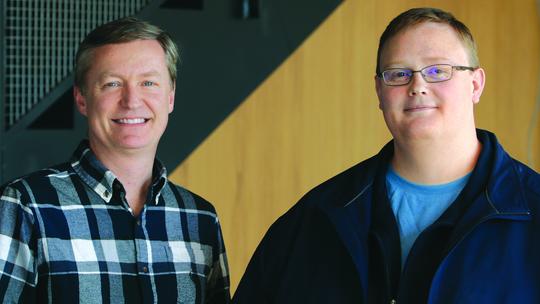
Argo received a big boost in 2017 when Ford announced it would be investing $1 billion in the Pittsburgh company in an effort to reach its then-goal of developing completely driverless vehicles by 2021.
Growth took off from there, with Argo opening its Strip District headquarters building in 2018, Volkswagen signing on as an equal-equity investor with Ford, and the company taking increasing steps toward autonomy.
On pavement, Argo came closer than many others in the AV space to making truly autonomous cars a reality. In fall 2021, the company teamed with Walmart Inc. to pilot autonomous goods delivery testing in Austin, Texas, and Miami. Earlier this year, it started offering AV rides to consumers using Lyft Inc.’s ride-hailing platform in both Austin and Miami. Both of these roll-outs maintained a human safety operator in the driver’s seat, but Argo also was conducting fully autonomous testing rides in both cities without human safety operators on board.
As late as April, Argo was expanding in its Strip District headquarters. But signs of stress started to emerge in July, when Argo cut 5% of its workforce and shuttered its Washington, D.C.-based operations.
Under the hood, Argo likely couldn’t keep up with the timelines of its investors or sustain itself with its cash on hand.
During Ford’s Q3 earnings call on Oct. 26, the Detroit-based automaker’s CEO Jim Farley said Argo failed to attract new investors after Ford decided to shift its own funding endeavors earlier this year from advanced L4 automated driver tech made by Argo to internally developed and less advanced L2 and L3 driver-assistance technology. Ford reported a $2.7 billion non-cash, pretax impairment from its investment in Argo, leading the company to an $827 million net loss for Q3.
“We still believe in Level 4 autonomy, that it will have a big impact on our business of moving people,” Farley said. “We’ve learned, though, in our partnership with Argo and after our own internal investments that we will have a very long road. It’s estimated that more than $100 billion has been invested in the promise of Level 4 autonomy. And yet, no one has defined a profitable business model at scale.”
Both Ford and VW went through three CEOs since Ford’s initial investment into the Pittsburgh startup. That likely contributed to Argo’s fate in addition to the at-the-time hyped promise that the potential AVs could bring, as well as a broader shift in automakers’ desire to electrify their vehicle offerings, a costly endeavor in its own right.
“I think when you look at where those companies were with what they were spending money on and what investors wanted companies to spend money on to the reality of where we are today, plus different management teams with different priorities, it’s much more difficult to make that case or sustain that business when there’s not a whole lot of revenue generation,” Kevin Tynan, a senior automotive analyst at Bloomberg Intelligence, said. “There’s obviously no profit generation there. It’s very easy for new management to come in and say, ‘okay, this is out, this stays, this goes,’ and that’s, I think, what’s going to happen in this space.”
Broader market conditions also are likely to blame for Argo’s demise. The Nasdaq Composite Index, an index of public companies heavily weighted by those in the IT sector, is down by about 30% year-to-date, which has had a ripple effect on tech company valuations and staffing operations across the country.
These industry challenges also have included a dry up of late-stage funding, which likely played a role in Argo’s challenges with attracting new investors.
“I’ve been through these cycles — 2001, 2008 and to a lesser extent 2014 — where late-stage funding just dries up, and because of that, it’s really, really hard for companies that have to continue because the availability of late-stage capital is just not where it used to be, and that’s the problem,” Jay Katarincic, partner and co-founder of Pittsburgh-based Magarac Venture Partners, said. “What [Argo was] trying to do is really hard, and that’s always the case when you’re trying to do something transformational. And unfortunately, when you’re trying to do something transformational, it requires a lot of capital, and [when] you run into a downturn in late-stage funding, you can have a result like you had at Argo.”
Speed bumps ahead
For Pittsburgh, Briem said, the scale of Argo’s shutdown is quite significant given the relatively limited status of Pittsburgh’s private-sector technology base compared to the efforts backed by the region’s universities.
“The vast amount of technology [development] that takes place here in Pittsburgh is still within the confines of academic and health care research, and the greatest challenge for decades has been the commercialization or spinoff of that activity,” Briem said. “I think it’s a fairly big deal in the short term here for the region. It’s a big deal for these workers, obviously. It’s a big deal for real estate development. I think a lot of things were not predicated on this going away so quickly.”
Don Smith, president of the Regional Industrial Development Corp., said there is short-term concern as to what Argo’s shutdown could mean for the region, but he believes events like these are likely a temporary phenomenon.
RIDC served as the landlord of Argo’s 2,800-square-foot test track facility at the RIDC Westmoreland Innovation Center. Smith said there has been some initial interest in a takeover of that site either from Ford or another company that could use the space, though it’s too soon to speak on that matter right now.
“Whether [this phenomenon is] six months or a year or 18 months, I don’t know, but I do know tech will be back, and I think that the lesson here is not, ‘let’s avoid tech.’ The lesson is ‘we need to do more to strengthen and grow and embed our tech companies in our region to better prepare them to compete,’” Smith said. “I think there’s a little bit of a wake-up call, but the alarm is not ‘oh, man, tech is dead here.’ It’s that we need to really focus on our business climate and supporting our growing companies and deepening our talent pool so that we can sustain these little ebbs and flows in whatever market it is, whether it’s manufacturing, whether it’s health care, whether it’s life sciences or whether it’s robotics and autonomy.”
As for what will happen with Argo’s global headquarters in Robotics Row, Ford is considering the possibility of taking over at least some of the space, which occupied most of the 130,500-square-foot Riverfront West building on Railroad Street. The automaker also is committing to hiring several hundred Argo employees across the AV company’s footprint.
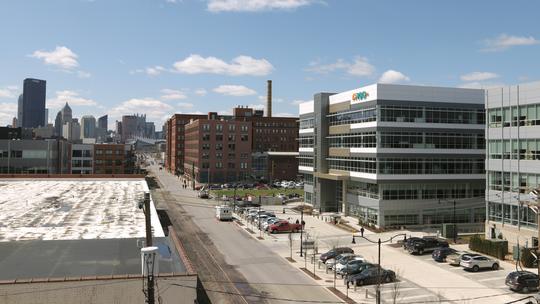
And as Ford looks to establish a presence here, the region’s two other autonomous vehicle firms continue to soldier on. Both Aurora Innovation Inc., which acquired Uber Technologies Inc.’s self-driving unit Uber ATG here in Pittsburgh, and Locomation Inc. are focusing initially on autonomous solutions for trucks on highway settings, unlike Argo’s more urban and consumer-oriented approach to AVs. Aurora, unlike Argo, also went public on Nasdaq last year before the markets turned south for tech firms.
In Aurora’s monthly newsletter, CEO and co-founder Chris Urmson offered remorse for the fact that Argo had closed, but also noted the industry as a whole is alive and well.
“This industry is small, we all know each other well and many of us here at Aurora have worked with the Argo team, watched them grow and seen the impact they’ve made,” Urmson said. “It is disappointing, and it is unfortunate, and their absence will be felt in Pittsburgh and in the larger AV industry. But I also want to be clear that this is not a signal that a future with self-driving technology isn’t real or imminent. … I have been in this industry for nearly two decades, and in this moment, right now, I believe we have never been closer to delivering self-driving vehicles to the world.”
Argo’s lasting legacy
For those in the AV space, Argo will be remembered as a pioneer. Its breakthrough Argo Lidar technology will likely live on in future Ford and VW vehicles.
“I think among the people who were inside the industry, I think everyone recognized that [Argo was] one of the good guys,” AV Analyst Edward Niedermeyer, author of “Ludicrous: The Unvarnished Story of Tesla Motors” and co-host of “The Autonocast” podcast, said. “But none of us are entitled to any outcomes, we’re only entitled to a process, and I think how you engage with the process matters. I think Argo did it as well as anyone could, and I think everyone who’s involved deserves to be proud of the work they did.”
There’s also hope as Argo’s engineers and other employees seek out their next opportunities.
“While it’s sad whenever a company goes out of business and people lose their jobs, I’m optimistic that Pittsburgh will continue to develop world-class robotics companies, and the talented employees at Argo will hopefully find other exciting world-changing opportunities in robotics here in Pittsburgh at the wide range of companies doing novel robotics across the city in areas far beyond just autonomous driving,” Matthew Johnson-Roberson, director of CMU’s Robotics Institute, said in a statement.
Joel Reed, executive director of the nonprofit Pittsburgh Robotics Network, echoed that sentiment in a statement of his own featured in PRN’s October newsletter.
“The talented employees that accepted the challenge to help solve extremely difficult problems for the good of everyone will continue to drive robotics, our region and society forward in their future roles,” he said. “Not every startup will succeed, but others will follow in their footsteps to continue to propel the robotics industry. Our region is known for responding to business challenges and change. And with a robotics industry as strong and diverse as ours, our future is stronger than ever.”
